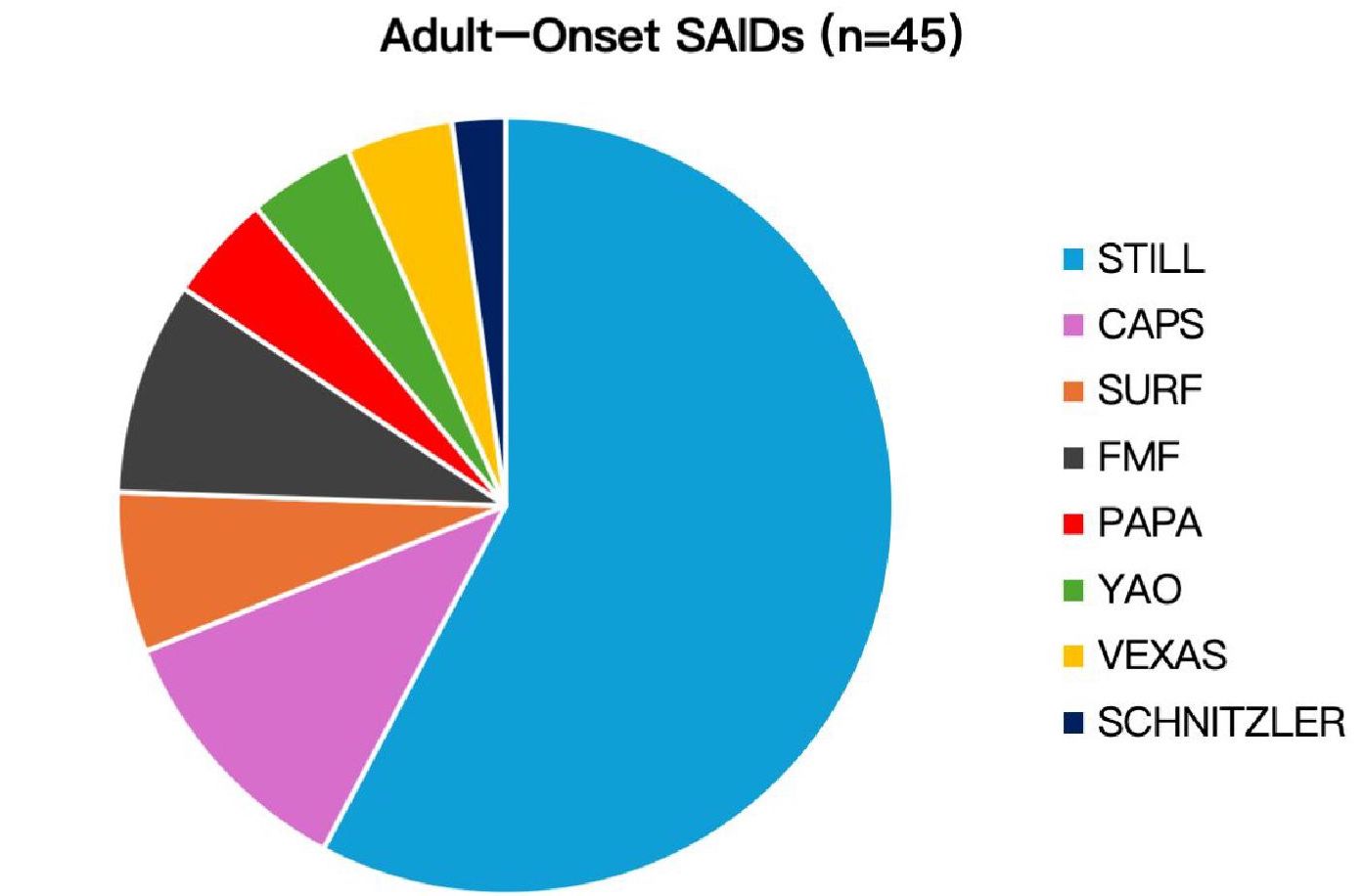Session Information
Date: Sunday, October 26, 2025
Title: (0233–0279) Miscellaneous Rheumatic & Inflammatory Diseases Poster I
Session Type: Poster Session A
Session Time: 10:30AM-12:30PM
Background/Purpose: Systemic autoinflammatory diseases (SAIDs) are rare disorders characterized by recurrent episodes of fever, serositis, gastrointestinal symptoms, arthritis, and/or skin lesions. In adult-onset SAIDs, clinical manifestations are often less pronounced and differ from typical pediatric features. The incidence and prevalence of adult-onset SAIDs remain unknown due to variations in classification criteria and heterogeneous population samples.Our objectives were: (a) to estimate the incidence of adult-onset SAIDs in a well-defined population, (b) to describe their demographic and clinical features, and (c) to document associated genetic variants.
Methods: We included all patients diagnosed with SAIDs with onset in adulthood (≥16 years of age) from January 1st, 2000 to December 31st, 2024 in Cantabria, Northern Spain. Patients were classified according to Yamaguchi and/or Fautrel criteria for adult-onset Still disease (AOSD) and Eurofever/PRINTO classification criteria for the remaining SAIDs. Annual incidence rates were calculated as cases per 100,000 inhabitants.
Results: We included 45 patients (24 women/21 men; mean age: 45.2±16.4 years). The mean annual incidence was 0.32 cases per 100,000 inhabitants, and the prevalence was 7.6 cases per 100,000. Patients were classified into the following SAIDs (Figure): AOSD (n=26), Cryopyrin-Associated Periodic Syndromes (CAPS) (n=5), Syndrome of Undifferentiated Recurrent Fever (SURF) (n=3), Familial Mediterranean Fever (FMF) (n=4), Pyogenic Arthritis, Pyoderma Gangrenosum, and Acne Syndrome (PAPA) (n=2), YAO Syndrome (n=2), VEXAS (n=2), Schnitzler Syndrome (n=1). The demographic and clinical features are summarized in Table.The most common manifestations were recurrent fever (88.9%), arthralgia/arthritis (88.9%), asthenia (82.2%), and rash (77.8%). The median time from symptom onset to diagnosis was 3 [1-24] months. Genetic variants were identified in the following genes: NLRP12 (n=3), NOD2 (n=2), NLRP3 (n=2), MEFV (n=4), CD2BP1 (n=2), UBA1 (n=2), WDR1 (n=1), TNFAIP3 (n=1), BTD (n=1), SCL40A1 (n=1), SLC29A3 (n=1), NLRC4 (n=1).
Conclusion: Over a 20-year period, the mean annual incidence of adult-onset SAIDs was 0.46 cases per 100,000 inhabitants, with a prevalence of 11 cases per 100,000 in a well-defined population in Northern Spain. A similar gender distribution was observed, with AOSD being the most common condition.
 Table. Demographic, clinical, and laboratory characteristics of 45 patients with adult-onset SAIDs
Table. Demographic, clinical, and laboratory characteristics of 45 patients with adult-onset SAIDs
.jpg) Figure. Classification of 45 patients with adult-onset SAIDs.
Figure. Classification of 45 patients with adult-onset SAIDs.
To cite this abstract in AMA style:
Lasa Teja C, Muñoz-Llopis L, Prieto-Peña D, Morante Bolado I, Martín-Varillas J, Paz-Gandiaga N, Blanco R. Epidemiology of adult-onset Systemic Autoinflammatory Diseases in a well-defined population from northern spain [abstract]. Arthritis Rheumatol. 2025; 77 (suppl 9). https://acrabstracts.org/abstract/epidemiology-of-adult-onset-systemic-autoinflammatory-diseases-in-a-well-defined-population-from-northern-spain/. Accessed .« Back to ACR Convergence 2025
ACR Meeting Abstracts - https://acrabstracts.org/abstract/epidemiology-of-adult-onset-systemic-autoinflammatory-diseases-in-a-well-defined-population-from-northern-spain/
